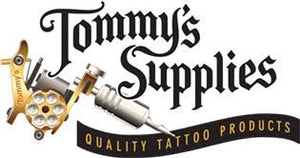How to Identify High-Quality Tattoo Inks: A Buyer’s Guide for Artists

Tattooing is a blend of art and precision, and the tools of the trade play a critical role in the outcome. Tattoo ink is the most essential tool. The quality of tattoo ink directly impacts the artwork's vibrancy, longevity, and safety. For tattoo artists, choosing the correct ink isn’t just about aesthetics—it’s about delivering clients a safe and professional experience. This guide offers practical tips to help artists identify high-quality tattoo inks that meet professional standards and exceed client expectations.
The Importance of High-Quality Tattoo Inks
The quality of tattoo ink affects more than just the final look of the tattoo. It plays a role in:
• Vibrancy: High-quality inks produce vivid, lasting colors.
• Safety: Reputable inks are made with safe, regulated ingredients, reducing health risks for clients.
• Consistency: Premium inks offer a smooth and predictable application process, allowing for cleaner lines and shading.
• Longevity: Well-formulated inks resist fading, ensuring the tattoo looks great for years.
Characteristics of High-Quality Tattoo Inks
Safety Standards and Certifications
• Compliance with Regulations: Look for inks that comply with local and international standards, such as FDA guidelines in the U.S. or REACH regulations in Europe.
• Sterile Manufacturing: Reputable inks are produced in sterile facilities to prevent contamination.
Transparency in Ingredients
• High-quality inks list their ingredients, allowing artists to verify their safety and suitability for clients.
• Vegan and cruelty-free inks are popular choices for ethically conscious clients and artists.
Color Performance
• Pigment Concentration: Inks with high pigment loads produce bold, vibrant colors that maintain their intensity over time.
• Opacity: Opaque inks provide better coverage and are ideal for vibrant designs, especially on darker skin tones.
Evaluating Tattoo Inks Before Purchase
Research the Brand
• Established brands like StarBrite Colors, Eternal Ink, and World Famous Ink have built reputations for quality and reliability.
• Look for reviews and testimonials from other tattoo artists to gauge the performance of a specific brand.
Examine the Packaging
• High-quality inks come in sealed, tamper-proof bottles to ensure sterility.
• The label should include information such as batch numbers, expiration dates, and ingredient lists.
Test Small Batches
Purchase small quantities of new inks to test their flow, color vibrancy, and healing properties on practice skins before using them on clients.
Common Red Flags to Avoid
When selecting tattoo inks, be cautious of the following:
• Unclear Labeling: Avoid inks with vague or incomplete ingredient lists.
• Unusual Odors: A strong or foul smell can indicate contamination or poor manufacturing.
• Excessive Separation: While some pigment separation is normal, inks that don’t mix well may perform poorly.
• Extremely Low Prices: Cheap inks may be counterfeit or lack proper quality controls.
Matching Inks to Tattoo Styles
Different styles require inks with specific characteristics:
• Lining Inks: These inks are designed for crisp, precise lines and have a thicker consistency.
• Shading and Color Packing Inks: Formulated for smooth blending and even coverage, these inks are slightly thinner.
• Specialty Inks: UV-reactive or metallic inks should only be purchased from trusted brands to ensure safety and performance.
Popular High-Quality Tattoo Ink Brands
Here are a few industry-trusted brands known for their commitment to quality:
• StarBrite Colors: Offers a wide range of vibrant, sterile inks that are vegan-friendly and comply with safety standards.
• Eternal Ink: Known for their bold colors and consistent quality, it is a favorite among professional artists.
• Dynamic Ink: Particularly famous for its rich black inks used for lining and shading.
• World Famous Ink: Offers a vast color palette with high pigment concentration and smooth application.
Tips for Storing and Maintaining Tattoo Inks
Proper storage is key to preserving ink quality:
• Temperature Control: Store inks in a cool, dry place away from direct sunlight to prevent degradation.
• Sealed Bottles: Always close bottles tightly after use to prevent contamination.
• Inventory Management: Rotate stock using the first-in, first-out method to avoid expired inks.
FAQs: Identifying High-Quality Tattoo Inks
Q: Are vegan inks safer than traditional inks?
A: Vegan inks are free from animal-derived ingredients and are often formulated with safer, more transparent ingredients. However, always check the brand’s safety certifications.
Q: How can I test a new ink safely?
A: Use practice skins to test the ink’s flow, color, and healing properties before using it on clients.
Q: Can I mix inks from different brands?
A: Mixing inks can create custom colors, but ensure both brands are reputable and compatible to avoid inconsistent results or reactions.
Q: What’s the difference between opaque and transparent inks?
A: Opaque inks provide solid coverage and are ideal for bold designs, while transparent inks are better for subtle shading and blending.
Q: How do I know if an ink is sterile?
A: Look for sterile labeling and ensure the ink is packaged in sealed, tamper-proof bottles from a trusted manufacturer.
Conclusion
High-quality tattoo inks are the cornerstone of professional artistry, ensuring vibrant results, client safety, and long-lasting designs. By focusing on safety standards, brand reputation, and testing practices, tattoo artists can select inks that elevate their work. Trusted brands like StarBrite Colors offer reliable, high-performance options that meet the needs of both artists and clients. Choose wisely, and your tattoos will stand the test of time.










